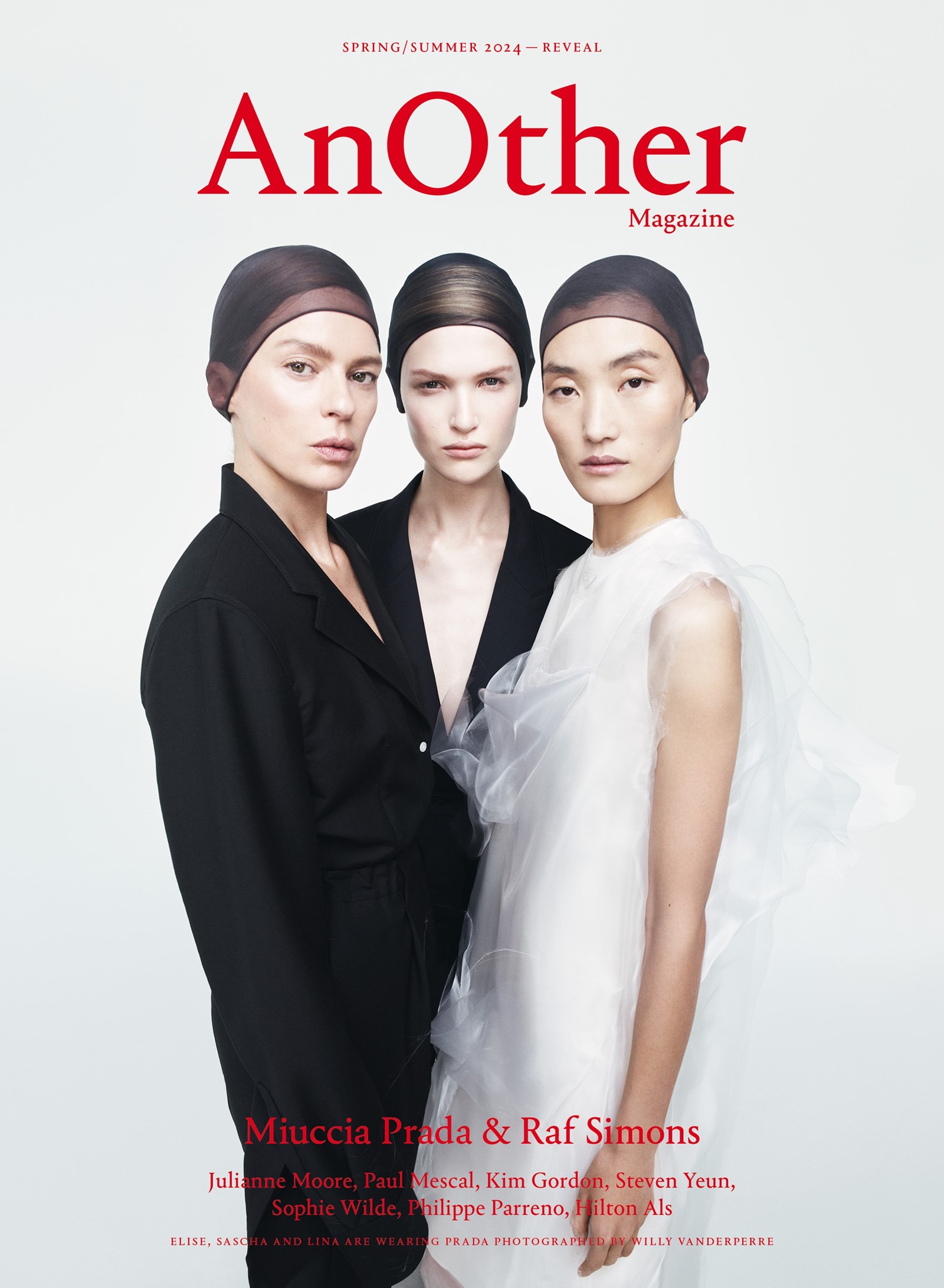This article is taken from the Spring/Summer 2024 issue of AnOther Magazine:
Following a standout show for the Spring/Summer 2024 season, the designers Miuccia Prada and Raf Simons reveal their distinct working processes, the joy of collaboration and the value of honesty and a name above a door. As they enter the fourth year of their creative partnership, their search for beauty and what that may mean today continues to evolve.
Susannah Frankel: It feels as if, despite a difficult climate, Prada is working. People understand Prada, what it means, where it comes from.
Miuccia Prada: The more we do what we like, the more it’s good. It’s kind of easy.
Raf Simons: It’s different here.
SF: How is it different?
RS: Here, the creative is the owner. It’s a completely different psychology – and that makes a big difference. That’s not to be critical of others ... but it’s different when you are a creative director for a brand that is no longer anything to do with the original owner, they’re long gone or whatever.
MP: It becomes business, pure business.
Alexander Fury: I think that’s the difficult thing, when a brand has to be answerable to an idea of growth and it isn’t growing, that’s a problem.
MP: That’s the worst because you have to [grow], otherwise you don’t survive.
RS: That’s an economic law. But on the other hand, Miuccia, we talk several times a week, and you say it’s unpleasant for you, even with a multibillion-turnover company – that it seems that the outside world is only judging the economic side.
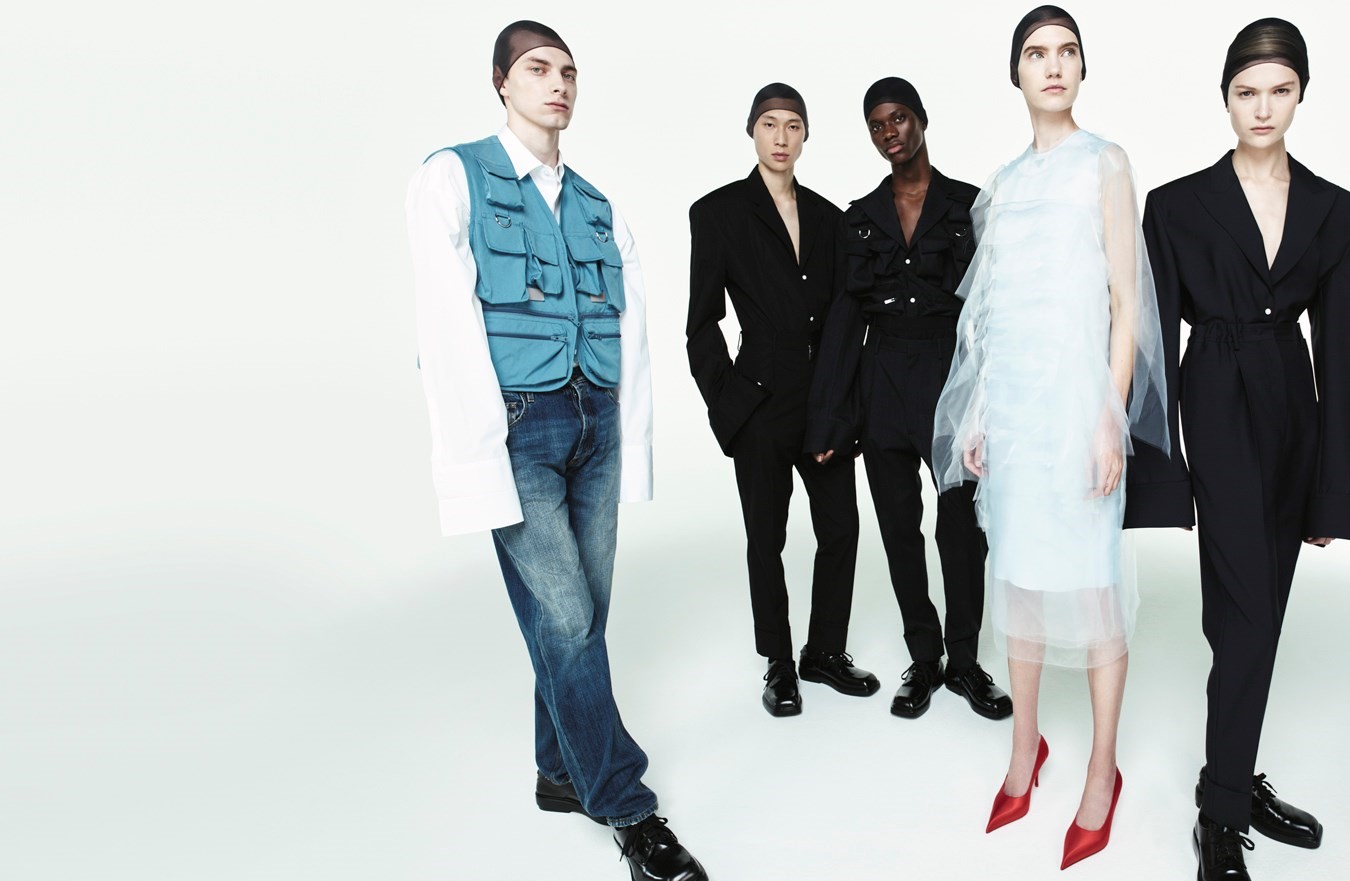
MP: Yes. It disturbs me like crazy, as if that’s the only measure. I am fine to be judged. But you have to perform across the board. Of course my whole life was about ideas. Me and my husband, we never cared – we never woke up and said we have to make money. Sometimes we made a little less, so we had to hurry up and fix it, but it’s not our ultimate goal. Our goal is to do things well, with passion – the idea of doing good. Anything you touch, you have to try to make it better. Otherwise why do you live?
AF: It’s also about a legacy, because the way you work insulates the company and makes sure that you can carry on doing this. It’s not about let’s make a lot of money now.
MP: For me, it’s about doing the best I can in everything I do – my work in fashion, at Fondazione Prada, being responsible and sustainable. I want to do it well, right, in every sector, to do better. Experimenting, pushing, researching. Constantly improving the life you touch. It’s very simple.
SF: Improving and being interesting. It’s not just making things better, it’s making things more interesting. It’s challenging.
MP: Yes.
RS: We must be honest. We cannot say it’s not about money. Of course it’s also about money – about business.
MP: It’s about money because you need money to do what you do.
RS: It is also pleasant if it is working well economically. It’s just that should not be the only measure and it should not be the only goal. Like true creatives, and I think we both are, our aim is to find a beautiful balance between the two. We cannot say we don’t care about business.
MP: No, I care a lot about business, because I care about the company.
RS: But at this level it is a responsibility. You have a lot of people to take care of and it’s a big responsibility.
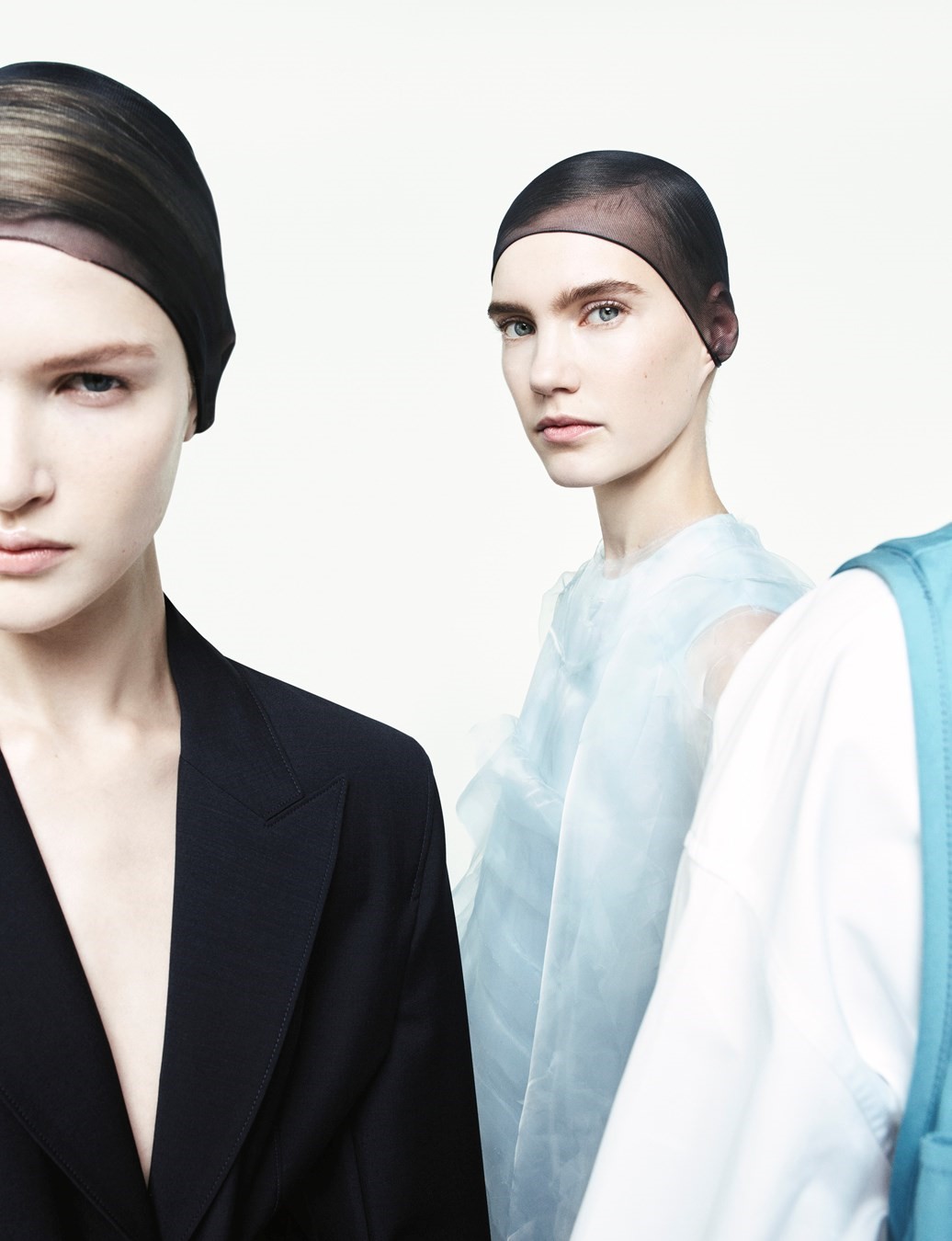
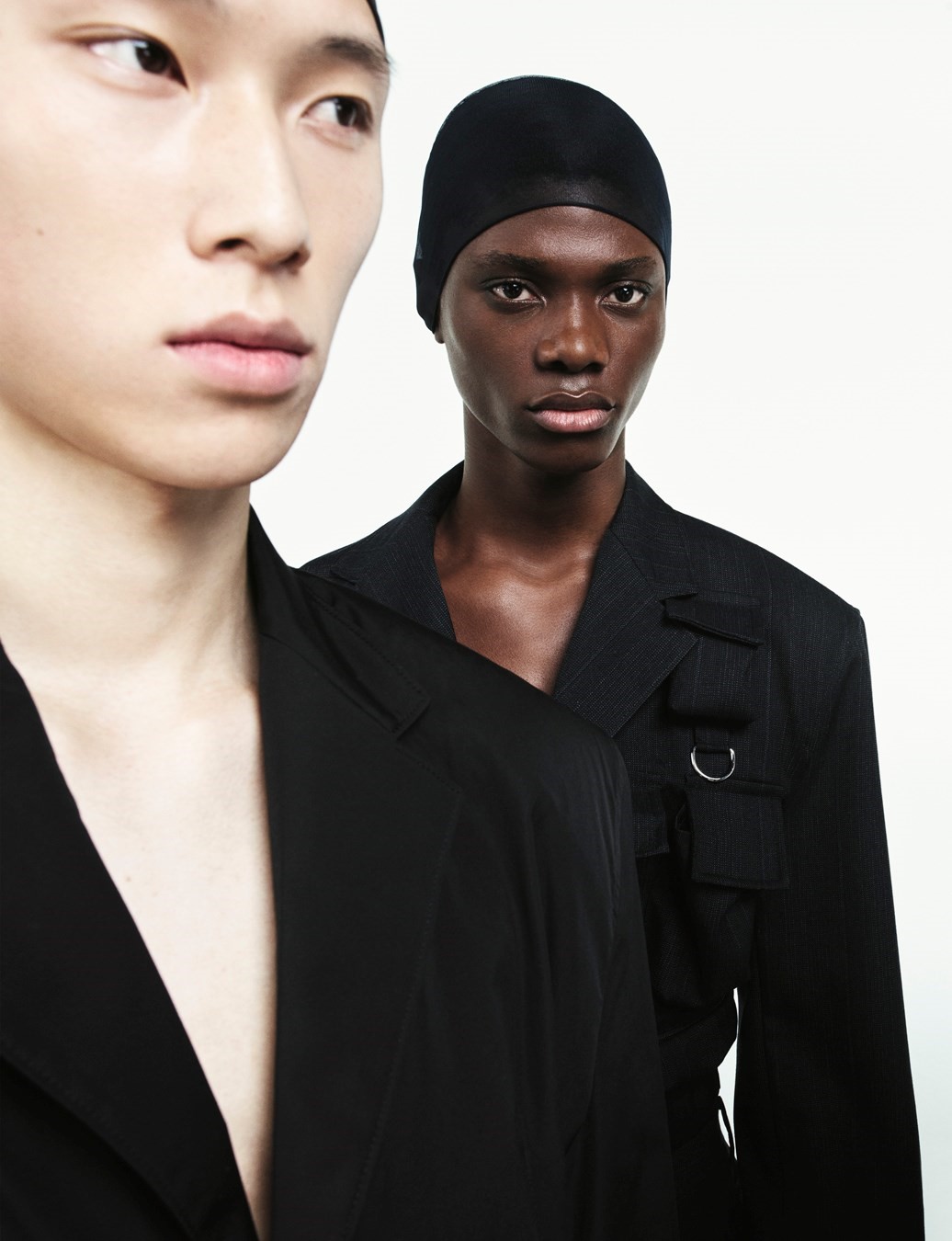
MP: I feel the responsibility.
RS: It’s a beautiful responsibility. It’s about giving something to people, giving jobs, money, work, security. It shouldn’t become a competition, either economically or creatively. And I have a feeling it is sometimes. It feels like a competition. I mean, as creatives we are competitive too, of course. Even us, we’re competitive – you want to be the best, you want to be great, you want to be amazing. [Laughs.]
I remember, Miuccia, you said that once. I think when I came to Jil [Sander] – when you and Mr Bertelli placed me in Jil – and you said, “Ah, now I have competition!”
MP: The competition is very helpful – it pushes you.
RS: But on the other hand, I think you have to see that as a challenge but not like, “I need to be the winner.” For me it’s never been about that.
MP: Not between us ... but in general, yes. I know I like to be good, for sure.
AF: I think competition is healthy.
RS: But you have all that stuff that is always comparing now – like Top Ten collections, Lyst Index number one. I feel like, once you’re there, there’s only one way ... So better not.
“As creatives we are competitive too, of course. Even us, we’re competitive – you want to be the best” – Raf Simons
MP: In any case I get angry when people speak well of somebody who doesn’t deserve it, when something is bad and everyone says it is fantastic. But if something is good I’m not jealous. When somebody’s good I recognise it, and I like recognising it – as I did with Raf.
RS: And that’s very much the case in the fashion world now. You have these big brands and they make however many billions turnover and it’s all sublime and then you look at the clothes and you think, “C’est pas possible.”
MP: Sometimes when I read some bad writing about us, I say, “OK, but this person said that collection was fantastic, so why should I care?”
RS: Sometimes I’m like, “Should I look twice? Did I miss something?” But then ...
SF: There’s an agenda?
RS: That’s the word.
AF: For this collection you both talked about beauty, a search for a modern beauty.
MP: Beauty in all its connotations, not just aesthetic but also moral.
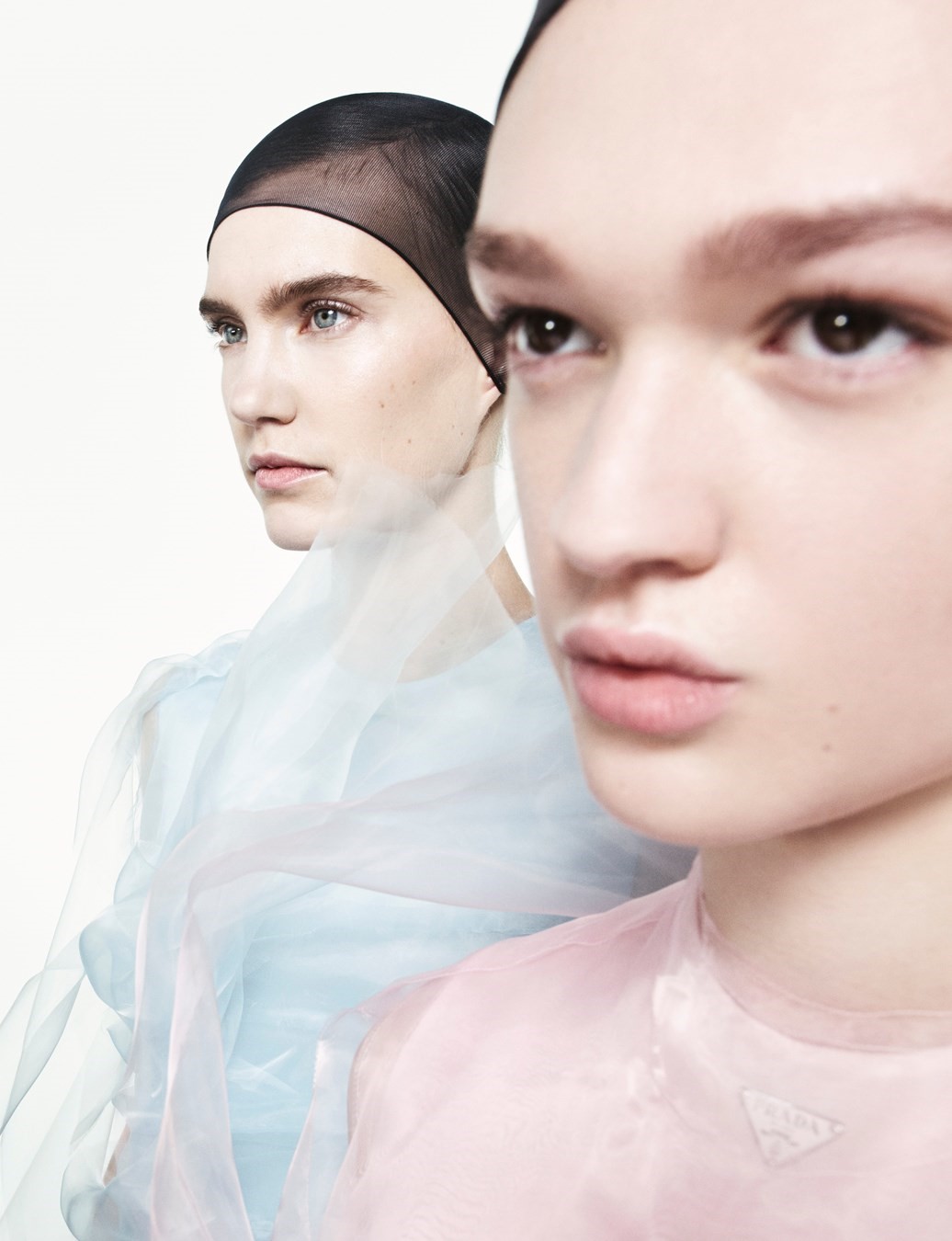
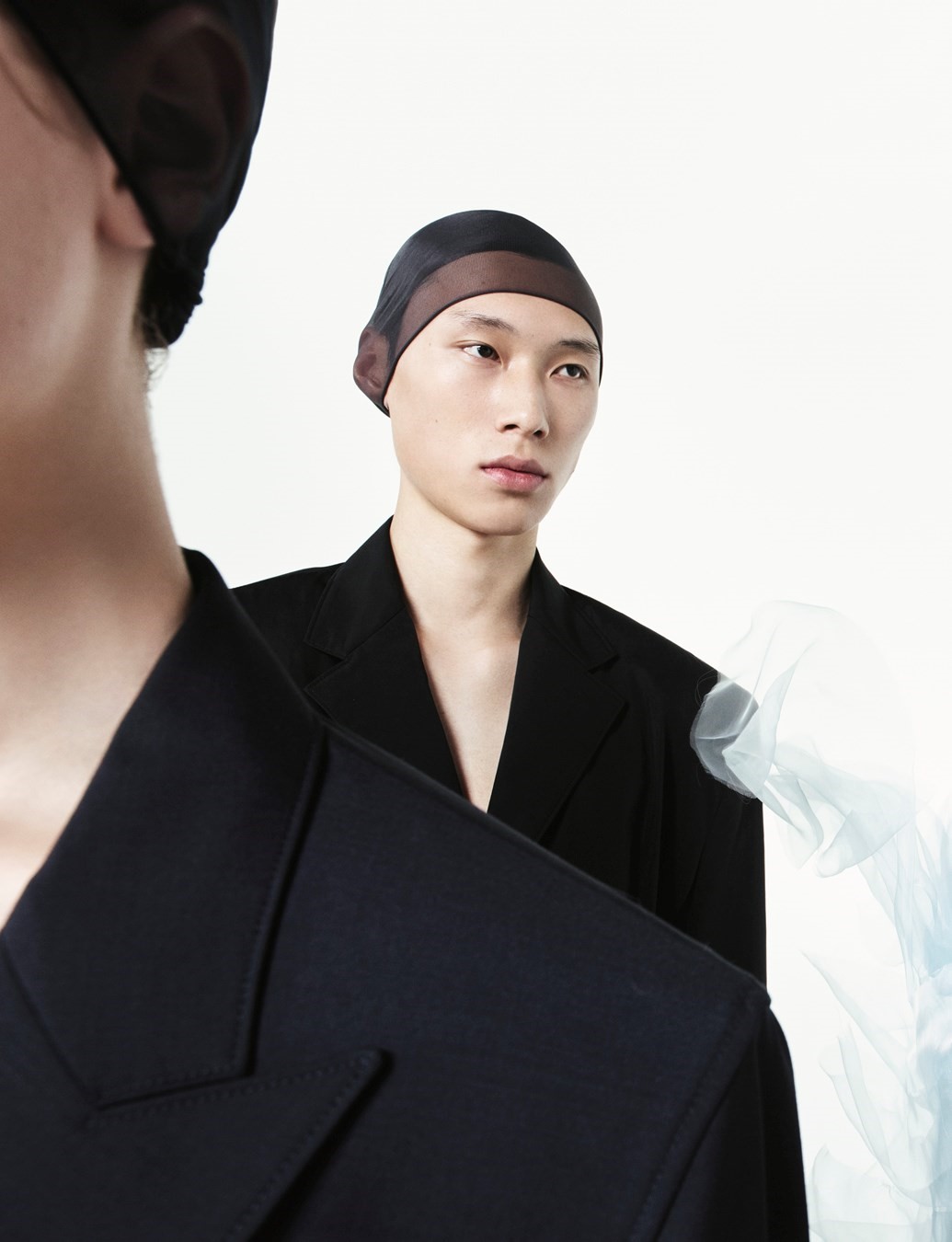
AF: I was going to ask how you define beauty now – but I suppose that’s the definition? An idea of bringing something better into the world.
RS: I think that it fluctuates. I think that for both of us – and tell me if I’m wrong, Miuccia – it is about the moment in time. Beauty might be more like a reality in certain moments, or it might be more extreme, exuberant or narrative at others, because that feels right.
And I think when we started [working together] we really felt like there was a beauty in doing something real in fashion again. It is not that I’m going to say it’s easy, but I think we both feel it’s almost easier to put something on stage that people are, like, “Wow” about, but then there is no reality to it and therefore we don’t think that’s a beautiful thing to do.
MP: In this moment.
RS: It’s evolving a little bit I think now, but yeah.
SF: When you say real, you mean grounded?
RS: No, more like when you start to know how the whole game works. For example you see a show and then you go into the store and it’s so disconnected – you think, “Why am I rewarding this brand?” Because isn’t our real goal, and therefore beauty, that people wear it? For me, that’s still the biggest satisfaction. When I see somebody wearing my clothes in the street, I love that.
“We both believe in being honest in our work. We are making clothes, expensive clothes, for people to buy. We are not artists. An artist is someone who has no fear and no agenda” – Miuccia Prada
MP: Maybe beauty is about doing things that make sense. The definition of beauty is impossible, but it’s about making things that make sense. And we both believe in being honest in our work. We are making clothes, expensive clothes, for people to buy. We are not artists. At least I never define myself as an artist. An artist is someone who has no fear and no agenda.
We’re working for a company, a commercial company. And the honesty of it is very important, intellectual honesty is very relevant. So we do what we care about. Let’s try to make clever, creative, beautiful clothes for people to wear, because that is the honest meaning of our job.
RS: And it’s also very rewarding.
MP: People trust us.
AF: They also rely on you, I think.
MP: Here we are, trying to be good, possibly creative, but the intentions are very serious. Sorry, getting older I am becoming a little bit moralistic. [Laughs.] I think that is my role, being an older person, to really transmit meaning.
SF: I was going to ask you about that, because you used to almost deliberately avoid moral conversations.
MP: Yes.
SF: Why do you think differently now?
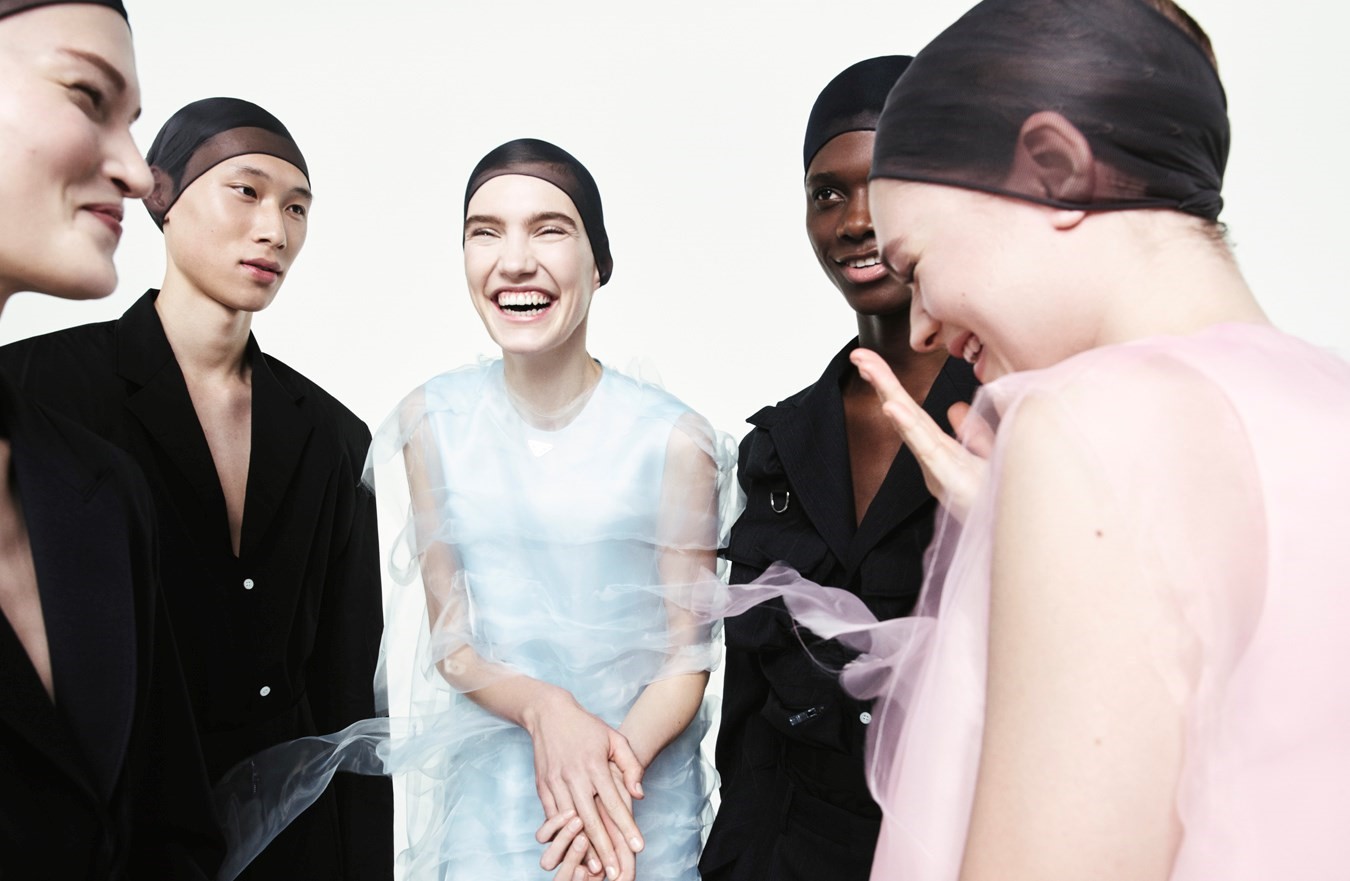
MP: Because I’m getting older.
RS: And because the world is changing.
MP: I remember, a few young people that I know told me, “If clever, good people shut up, all the other ones will talk.” And they said, “So you have to talk.” And from there I started thinking that I should stop shutting up. It’s not my nature, but I’m forcing myself. Because otherwise everyone else [talks].
RS: The world is not silent.
MP: Everybody has an opinion. Everybody talks about everything.
RS: This is a sensitive topic for me ...
SF: Are you talking about social media and the fact that everyone has a voice? Is that a good thing or a bad thing?
RS: I think it’s great that everybody has a voice, but because so much goes out it’s much more difficult for people to understand what to concentrate on, what to listen to or what’s right, what’s wrong. It’s just very chaotic in that sense. That’s maybe why we feel it’s crucial to concentrate on what we are really passionate about.
It goes back decades now. I think that fashion as a whole – not everybody, mainly bigger brands, including Prada – wanted fashion to become more democratic, without asking if it actually can be.
MP: Depends on what you mean by democratic. It’s expensive. For sure, not everybody has access to luxury.
RS: It’s very complex. Fashion used to be for a very small community. I’ll give an example. One of the main reasons I started my brand was because I didn’t identify with what I saw – big, muscled, tall, suntanned, uber-beautiful men on stage everywhere throughout the Eighties. I identify with a different kind of body type, a different kind of person. And maybe you identified with a different kind of audience that thinks in a different way, Miuccia?
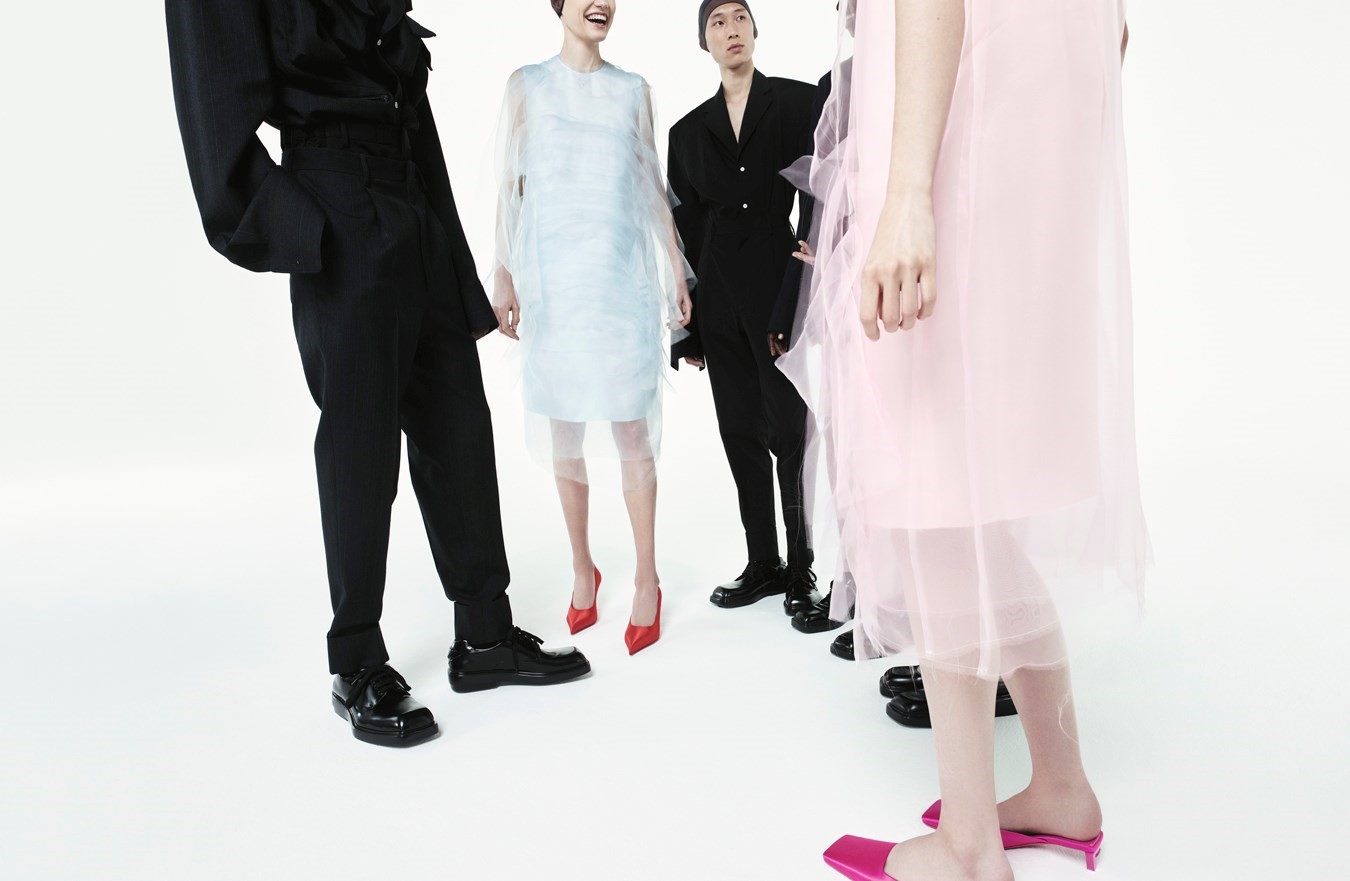
MP: Yes. I started this job because I didn’t find anything to buy for myself.
RS: My point is that I think all the brands are there for a certain reason and probably a great reason because that was the nature of why they started. But what changed is that lots of the big brands don’t think like that any more. They want to reach everybody.
SF: And they lose their identity?
RS: It’s also a conflict because it’s not really what the brand was about.
AF: It’s not even a want – it’s seen as a necessity. You have to create one thing that satisfies everybody. It’s an impossible thing. But with Prada it’s not about conquering the world, it’s about trying to produce something with meaning.
MP: Yes, exactly. The meaning is super-important. We ask ourselves every time, “Let’s do a jacket like this, or like this. Why?” For us there’s always a reason, a fashion reason – because no one else did it, because it’s for the moment. I can’t work without a reason.
RS: Because what we do, it comes out of thinking and therefore also dialogue.
SF: Can we talk about your design processes?
RS: We don’t work on a mannequin and drape, for the technique only. I could not possibly do that, and you couldn’t either, Miuccia, I think.
MP: No.
RS: It’s not our desire. The aspect of communication is crucial, but therefore it also becomes communication with an audience, even if you don’t talk. I’ve always thought that fashion was, for me, the most interesting if there was a form of communication. Even without a verbal dialogue. It can be a kid in Tokyo. I feel like I have a dialogue with that person even if I don’t know them. Because there is an understanding of the process of thinking, or maybe not an understanding ...
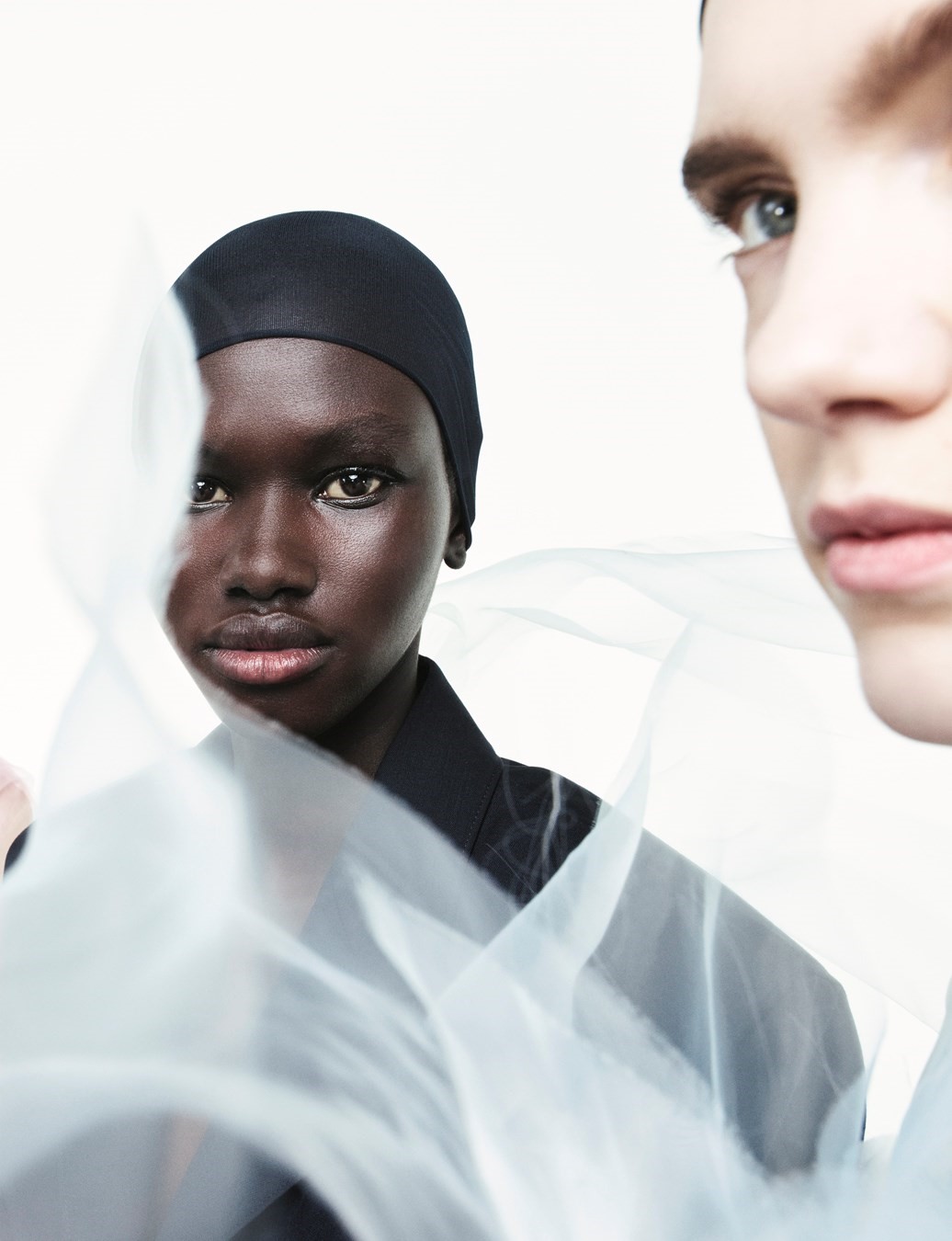
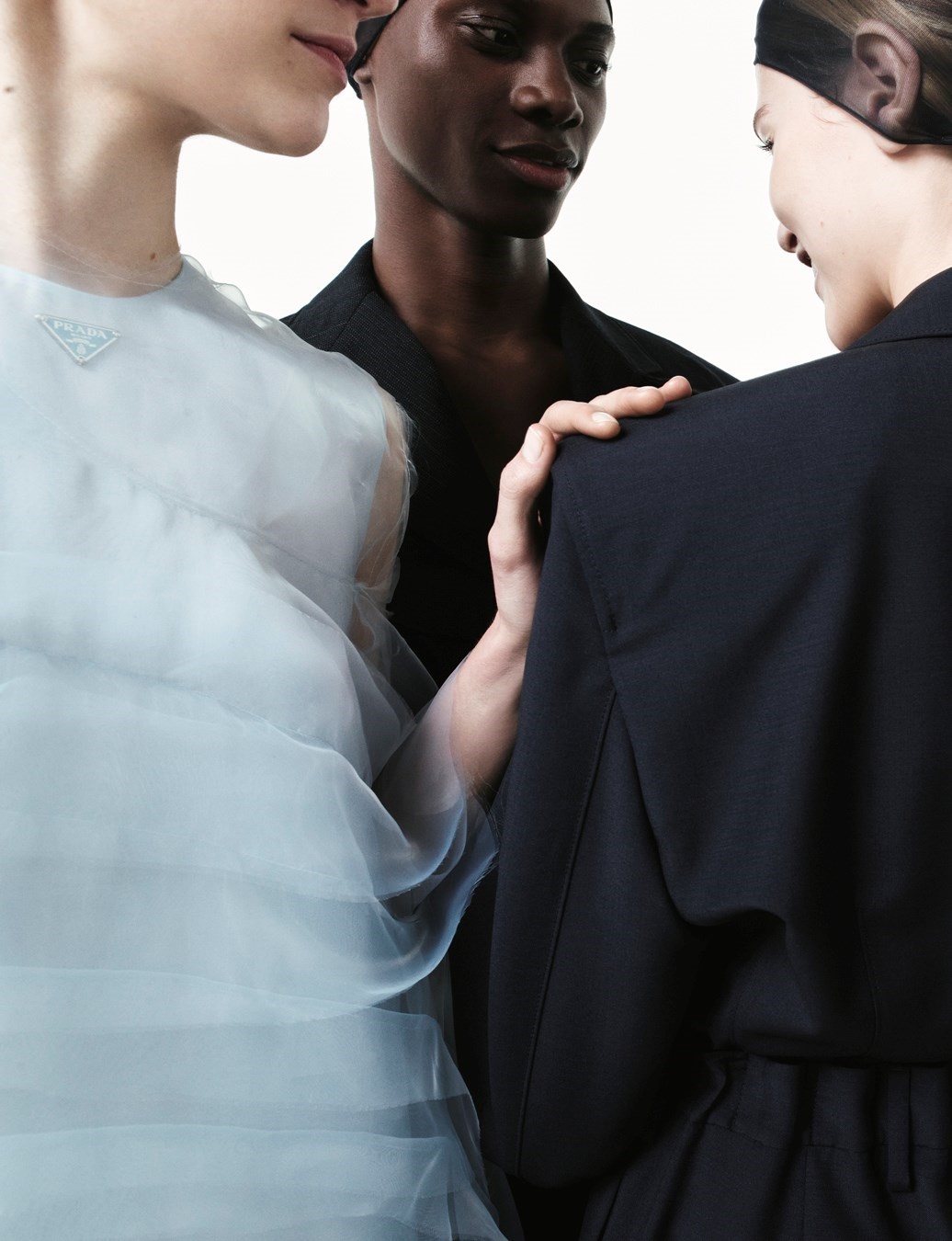
AF: A curiosity?
RS: When I designed something in my brand – actually, in any brand – I am very aware that, when it goes out in the world, for many people it has a meaning. But it doesn’t mean that they have a direct understanding.
Miuccia thinks, I think, that part of my strength is that I am still able to approach the brand as an outsider, not only as an insider, so as somebody who was watching it, buying it. But my point is simple. When I was looking at Prada, I didn’t always understand what Miuccia was thinking. But I have an understanding of her thinking in general, and that’s what puts me in dialogue with it. I could connect to it. I like that, or I don’t, or it challenges me, or I disagree with it. But there is a reason for me to connect to the brand. That’s a dialogue.
It’s very difficult to explain. I find it very easy to go into any brand and find at least a few nice items. But I have no interest if I don’t know what’s going on – they’re just beautiful items. Miuccia did collections and I completely got them – and sometimes I really had no clue what was going on in her brain. But that’s just as interesting. Sometimes even more interesting.
SF: Are those the collections you especially like?
RS: Yes. Because they make me think. But I don’t look at Miuccia’s earlier work in the sense that I agree or disagree with a collection. It’s not how I look at brands anyway.
MP: I was always somehow linked to what he was doing. And sometimes saying, “Oh my God, I should have done this myself.”
AF: The competition you were talking about?
MP: I think that the best expression of a person is their work – your writing, his designs. I don’t need to talk about it, I know it’s there because I recognise it through his work, how he went from one season to another.
RS: Whether or not you understand, there is already a connection and therefore a dialogue – even if you don’t talk. We never really talked so much before we started working together. We knew each other a bit, back to Jil and all, but we weren’t meeting often.
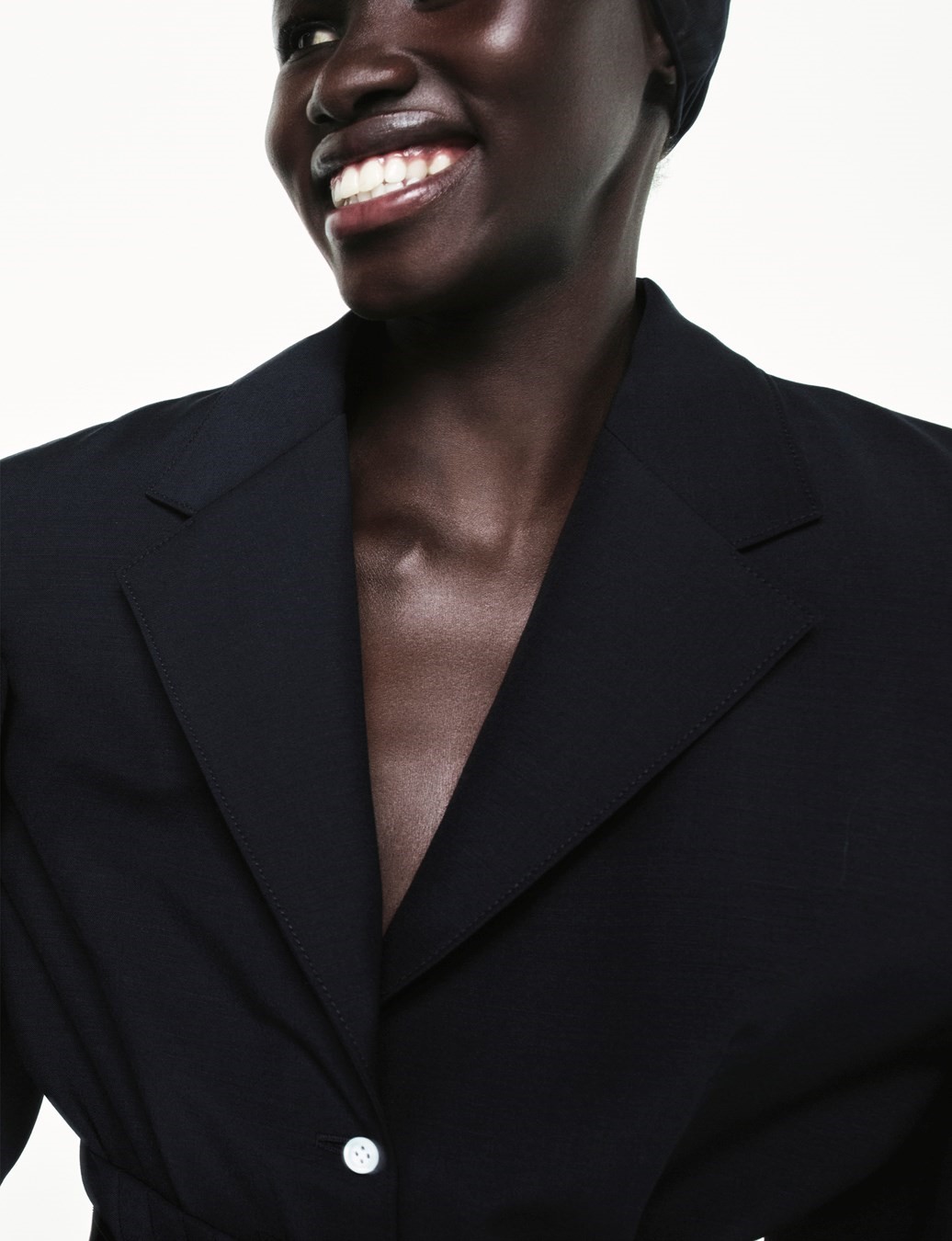
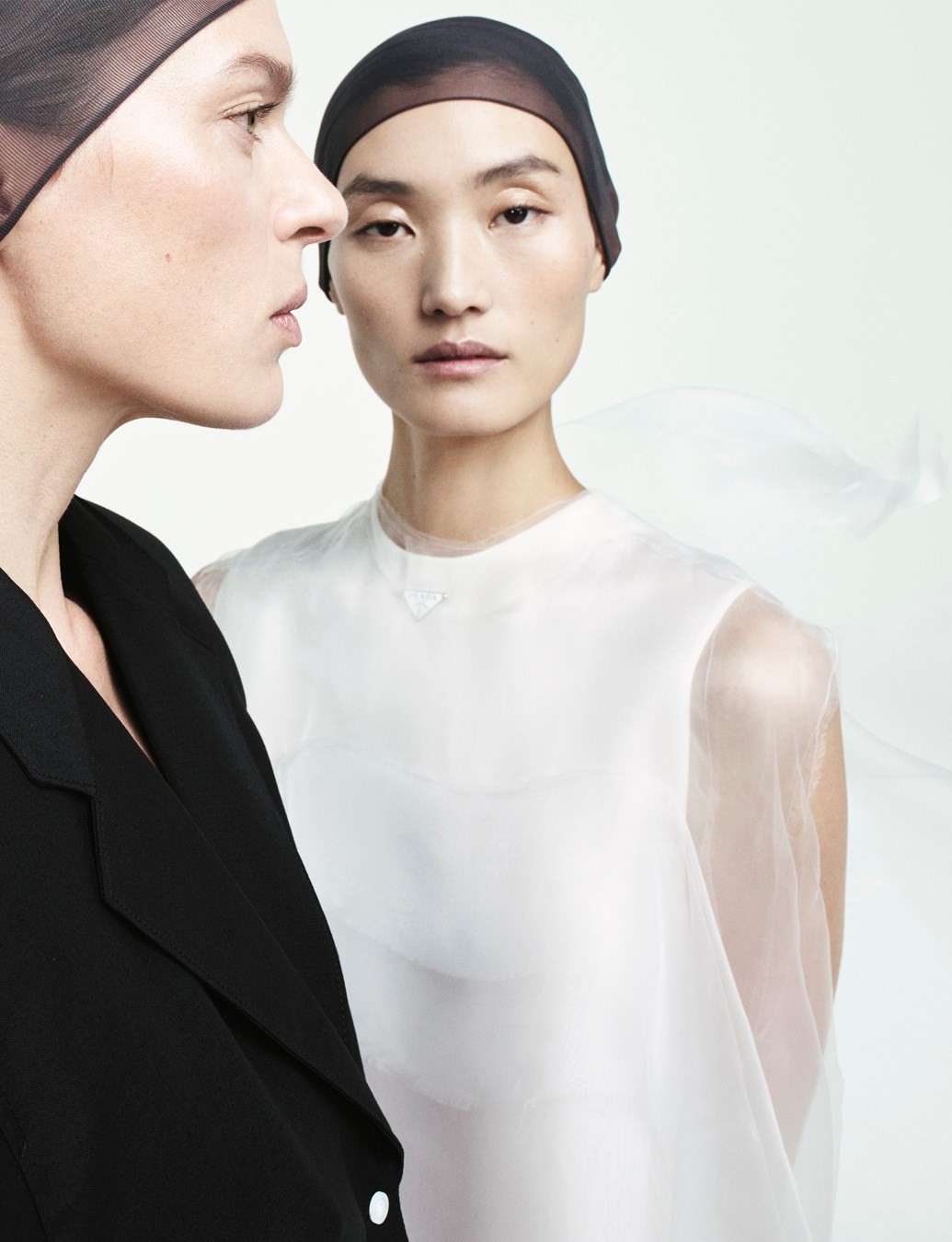
MP: Also, now we discuss what to do, and each of us has our own ideas. But I trust him, because I trust him in principle – because I know what he did with his work.
RS: One thing is a person and then there’s a body of work and you cannot completely ...
AF: You can’t divorce the two. There’s some connection.
RS: From watching a body of work, over time, you begin to have an understanding of who this person is. That’s what makes you either connect or not.
MP: This works also with art and the artist that made it.
AF: You share beliefs.
RS: There is also the fashion world – I see the work and I might like it but I think, “I don’t know if I want to know that person.” There is something that I think is politically incorrect. There are things I start to have a problem with, but I can still love the clothes. It’s two different things.
MP: It is the same for me with artists. There are artists I recognise but I don’t connect with because I am less interested in those debates.
RS: Perhaps that’s it – there are collections of Miuccia’s that were maybe not my thing but didn’t disconnect me.
AF: You appreciate her mindset.
RS: That’s the whole point. That’s what I mean. Most of them I loved anyway.
AF: People have asked me before, “What about the Prada collections you didn’t like?” And I say, “There are some that maybe I wouldn’t wear myself but I can appreciate the thought process.”
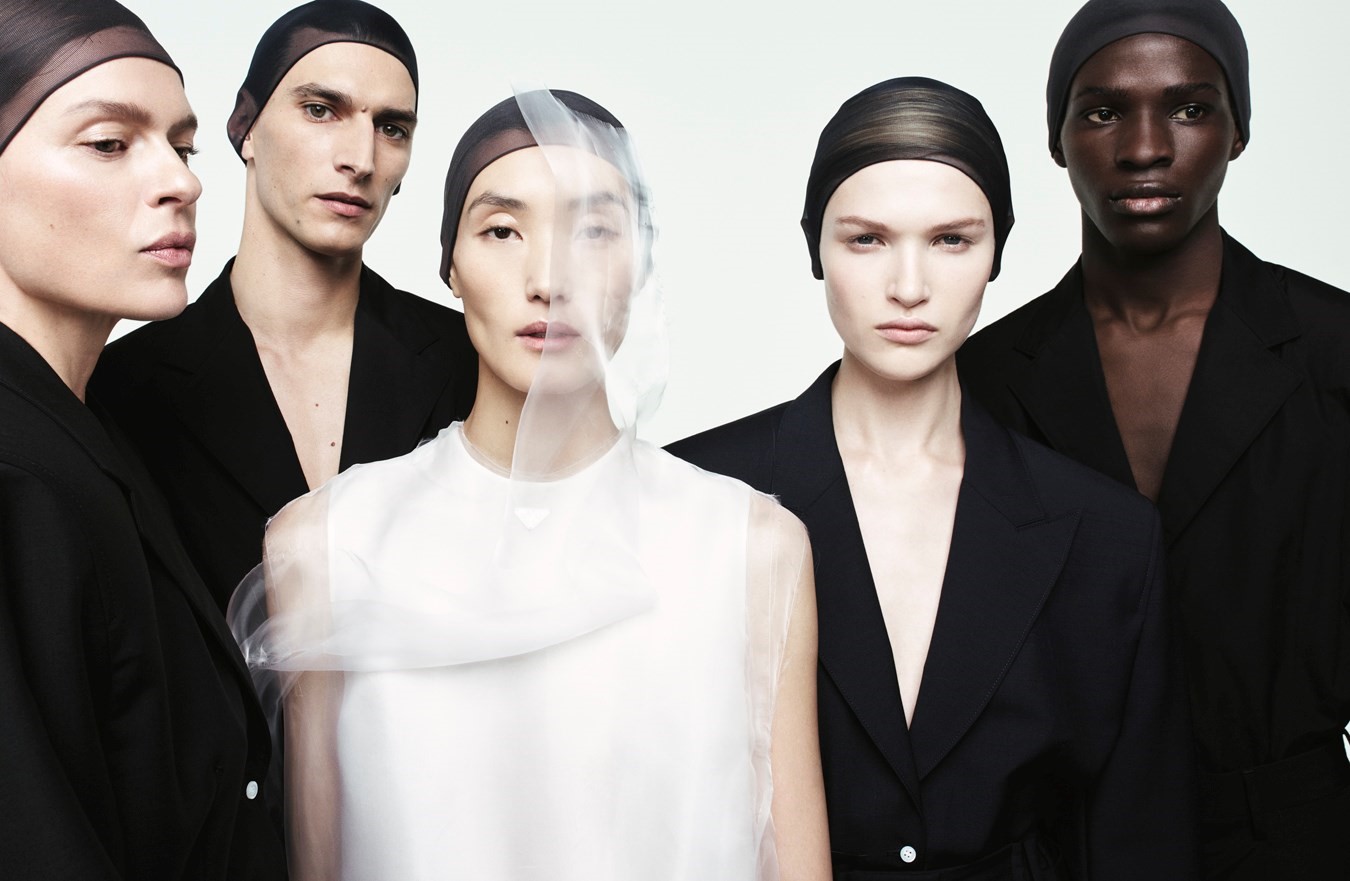
RS: I think that’s maybe what makes this community. Or if Miuccia would do a collection and it wasn’t really my favourite, I would still go and buy something from Prada from that season. I don’t want to suddenly go to another brand when I don’t really connect to the designer’s way of thinking.
AF: Why would someone choose to buy a black sweater from Prada rather than from another brand? Because Prada is who they identify with and who they wish other people to identify them with.
RS: Exactly.
AF: There are so few brands like that now, though. People buy things from lots of different brands today. Whereas you still have people who believe in what you do and that’s a really wonderful thing. People who want to be identified with you and your beliefs and what Prada represents, and it’s such a powerful thing in a world that’s so fractured and disloyal.
SF: We’ve talked before about the idea of Prada being intellectual and I remember saying, “How can a dress be intellectual?” But in this context, this world, it is.
MP: Absolutely. That’s true. So much brain, so much effort.
AF: Well, there’s also a belief system attached to it, which maybe sounds a little pretentious.
MP: Fashion is good because it has rules. Discussions that are about clothes are as serious as discussions about anything you do – if you cook, if you write, you have to do it following the rules of your work, or by changing the rules, whatever. Dedicating attention, effort, ideas to problems we have to solve.
“By our nature, here, we can like everything and we can hate everything. We can go everywhere if we want to. We are instinctive, both of us are very instinctive, but we can like anything” – Raf Simons
RS: I think Prada has longevity because it takes a position on so many things. Some brands – and again this is not to criticise, because some were my favourites – they were about one thing.
AF: Like a silhouette or a fabric?
RS: We talked about it many times in the past. There are designers that have this one thing because that’s their nature. That’s what they like, they cannot possibly like something else. And then they repeat that. And it fits in at a certain moment in time, for five years, a decade, two decades, and then ...
AF: Like Claude Montana, where it’s so anchored to the Eighties.
RS: ... at some point it will be over. By our nature, here, we can like everything and we can hate everything. We can go everywhere if we want to. We are instinctive, both of us are very instinctive, but we can like anything. I can like a stupid cookie as an inspiration.
And at Prada it’s not just in terms of clothes. There are the other things. There is the Fondazione, there is ecological responsibility, sport, there are so many different things. And you – Miuccia – as a person. There’s so much more.
MP: Me, I’m interested in the world. And I have this anxiety of needing to know more.
AF: But the interesting thing with Prada is it’s about this continual change and reinvention ...
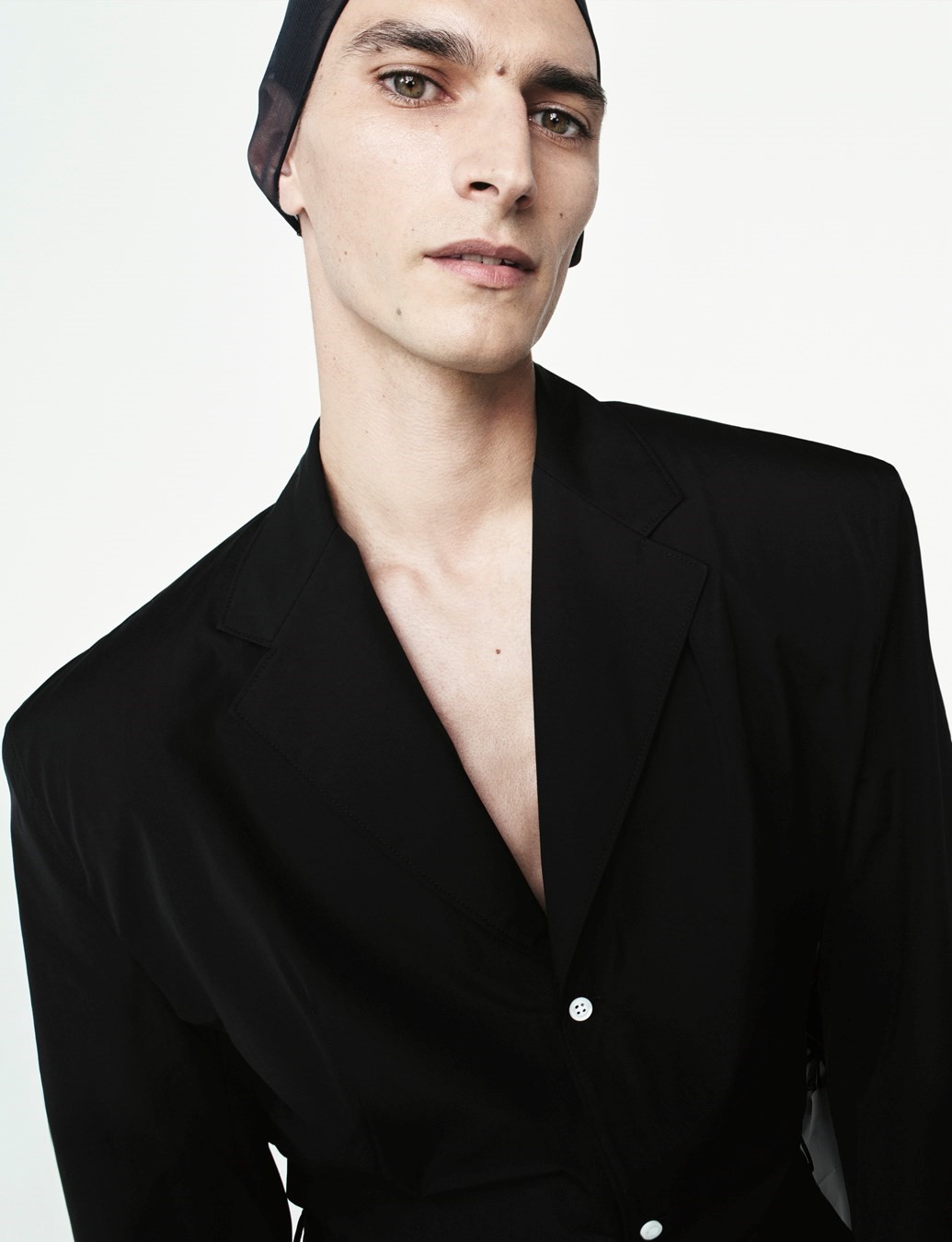
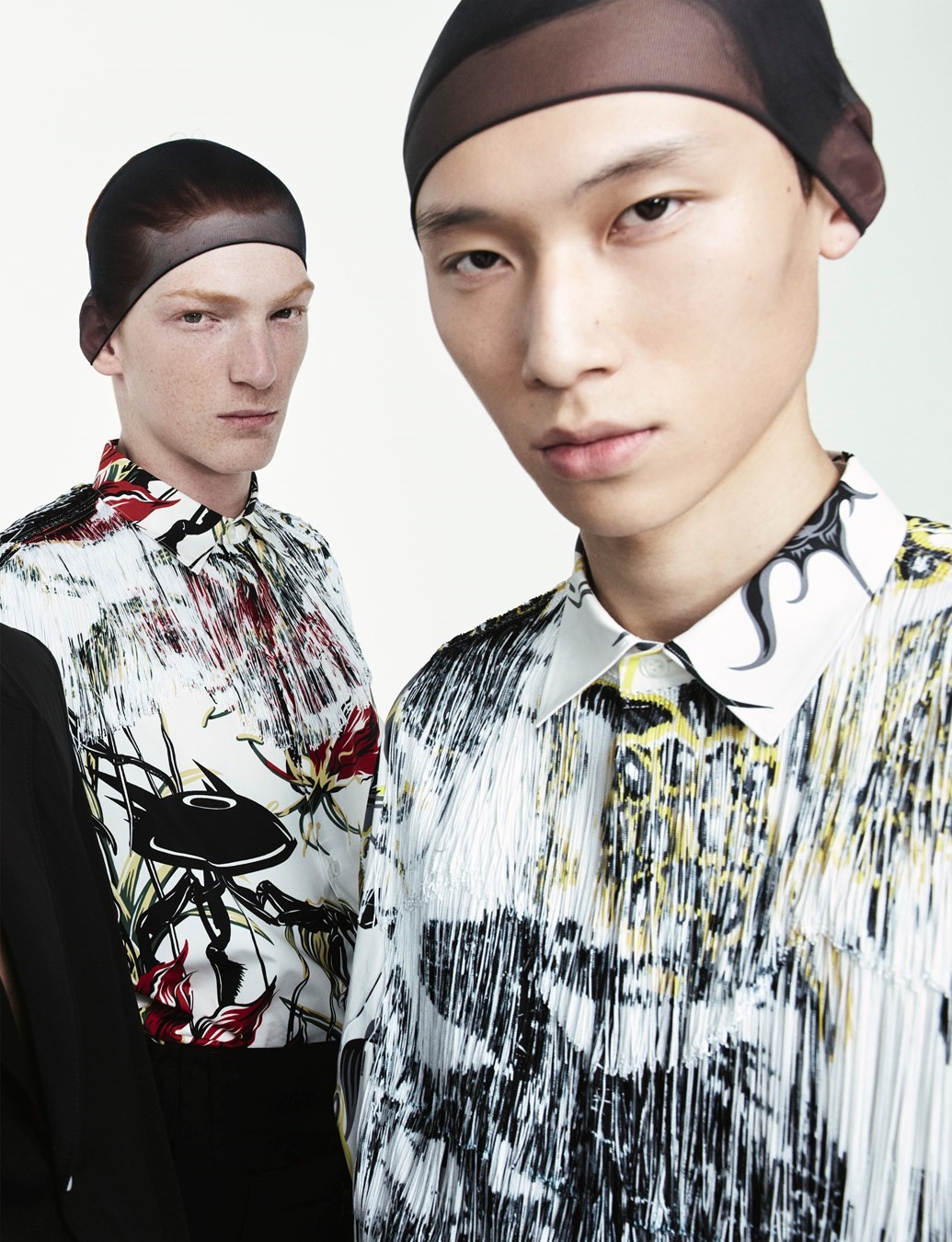
SF: It’s about fashion, not clothes. I think when somebody’s always doing the same thing, it’s clothes for me. And a fashion sensibility is …
MP: Fashion is part of the world.
AF: Because the world is changing all the time.
SF: It shimmers, it’s elusive, it’s about instinct.
MP: And that’s why now it’s more difficult than before. Because before, until the Nineties, the world was perceived smaller. Europe, North America, a little bit of Japan and the rest not really connected. Now, since the internet, everybody is connected. For me that is the biggest change and challenge. You face races, religions, differences of all kinds. It’s more difficult.
AF: Everyone sees everything. And I think sometimes the nuances of things are stripped out, they become face value.
MP: This is also a problem for politicians.
AF: Artists as well.
MP: Because also people are more or less the same. In the end, if something is good, it is good for everybody.
RS: I love Miuccia’s honesty. Sometimes she says, “I don’t know.” What I hate in the job is the big owners that behave as if they know.
SF: You have to have the intelligence to say you don’t know.
RS: It’s all cultures open and connecting. But there are a lot of cultures that we don’t know. We can’t understand them deeply, and we behave superficially as if we understand them.
AF: You started to touch on it before but what is the actual process of you two working together like? You were saying you don’t drape. So how do collections begin with you both?
MP: We talk.
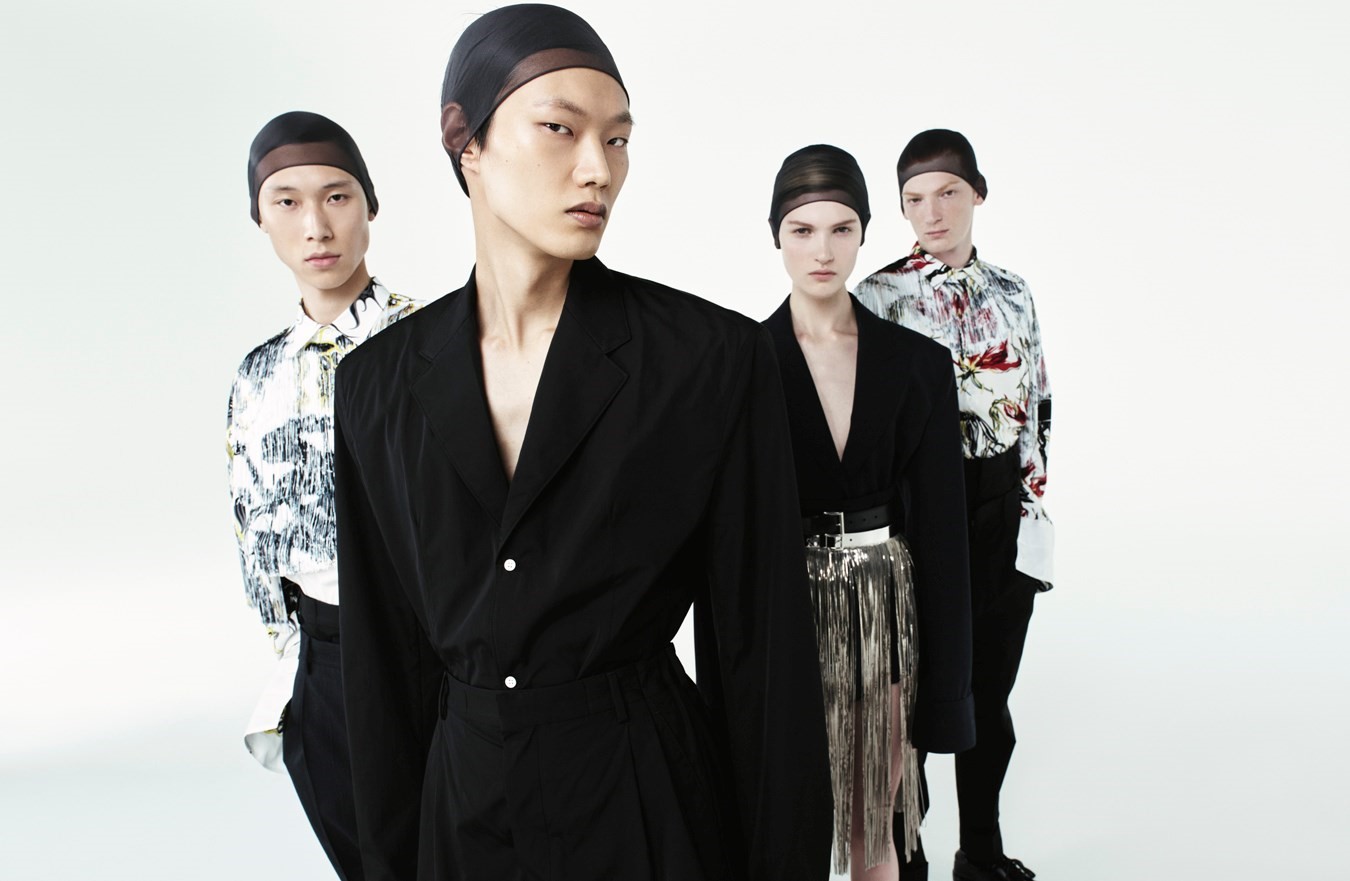
RS: Always. But for both of us it’s always been like that.
MP: So, to be honest, I didn’t find working alone or working with him different. Of course I’m happier because I have a dialogue with somebody like him, but I don’t see any differences.
RS: It didn’t change a lot from how we used to work before. In smaller things, we might be very different.
SF: Like what?
MP: He wants to see the colours, the fabrics, on the person. Me, I choose in theory. But I realised that, this way, you really understand. May I say that?
RS: You can say whatever you want, of course.
MP: He makes people walk with a piece of fabric in a colour. And you really see, if you can imagine a whole thing, in that colour, on a person ...
RS: I need a lot of visuals.
MP: Me, I always treat everything in theory. More in theory than on the body.
RS: Miuccia can do everything on a table.
MP: Yes. That’s the biggest difference probably. He wants to see things on people – and me, no. Because for me it’s only a theory. But actually, now, when we finish the work, we know it works. Because he checked on the person. Me, I was doing theory. But sometimes after I start putting it on people and ... [Laughs.]
SF: You mean you’re not interested in fittings? What is it? It’s just not the way your mind works.
MP: No, no.
“He wants to see things on people – and me, no. Because for me it’s only a theory” – Miuccia Prada
RS: I think you also have a fascination with a theory, working. But at the end, one way or another, it is going to have to be there, in front of you – five minutes before the show, one day before the show. Then, she’s also the most honest person. It works or it doesn’t work. In or out. You’re very honest.
MP: That’s a good thing.
SF: You know straight away.
RS: I think it comes from how you grew up – not as child, but in your brand. Miuccia had the possibility to do that. In my brand I did not have the possibility. I could not say I’m going to do these seven colours and then five don’t work. I needed to make sure, so it became all visual.
Let’s say I make your look, Alex. It’s knitwear. I will have a little swatch in another colour. I pin it on you and I make you walk to see if it needs a brighter colour.
SF: Is that really what you do?
RS: Yes.
MP: Because he needs to see it in movement to decide.
RS: Not for an idea, not if it’s a theory. We have an idea. We talk. I love it, she loves it. If she hates it and I love it, we say no. If I hate it and she loves it, we say no. Sometimes, of course, if she really likes it, I’m like, “Should I hate this? I should pay attention.”
MP: When he’s obsessed with something that maybe I don’t like, I’m very curious. The fact is, when we finish the thesis, we already know it works. For me, his process is fundamental. Sometimes my clothes were not so appealing or something, because I never tried it on the person ... so it’s a good new process. [Laughs.]
SF: That is so fascinating. I think that’s why I love your clothes. It’s lovely to wear something with ideas behind it, even though those ideas are not spelt out. They’re discreet but they’re there.
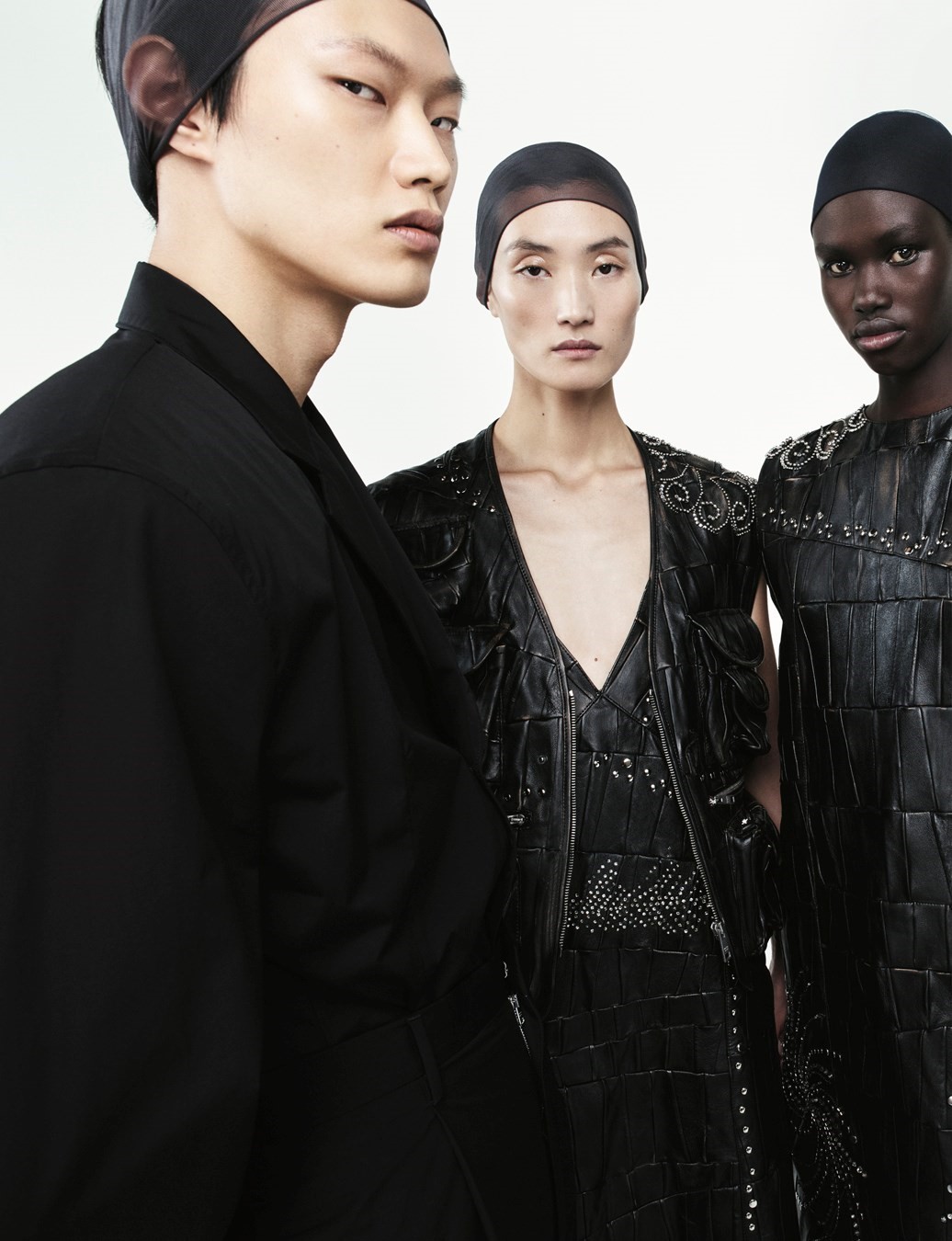
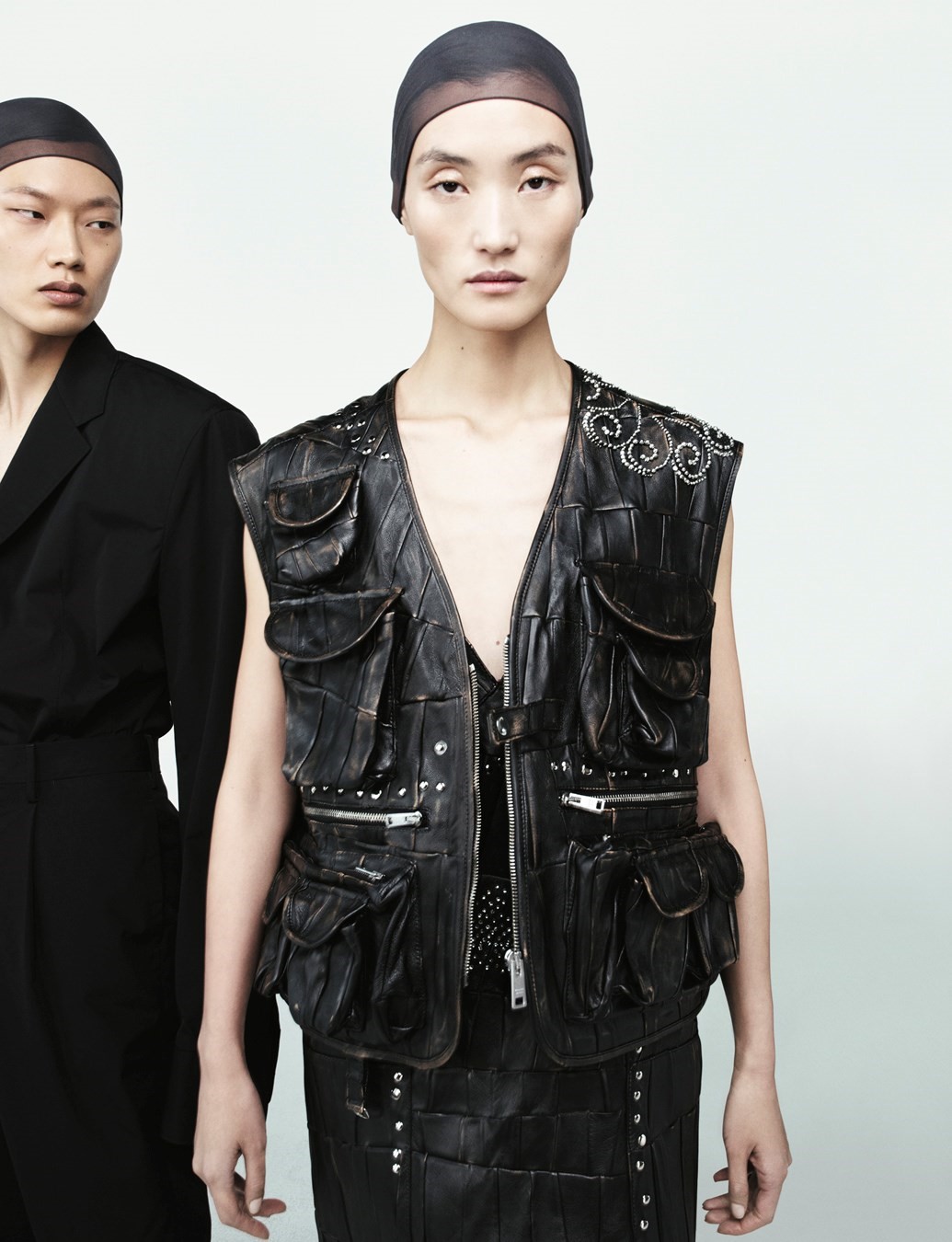
MP: He does the same – but he also checks the reality.
RS: I check the reality, but still in the ideas in her head there is a lot of reality, more than you would think.
MP: I’m super-linked with reality.
SF: But the ideas are in the seams.
MP: Also, I am now learning from him to look at clothes and actually ... The first two seconds, I tend to judge the way I always judge. But after, I hear his comments and I understand much better and get an explanation of my instinct. Even if at the beginning I was into my theory, when he says something different I realise I was about to say the same. It’s the same when we judge advertising.
RS: The weird thing is ... we are way more the same in our final decision-making and judgments than anyone would possibly think before we started working together. I agree, a lot, all the time. It’s not often that we discuss, in any case – but also not very often that Miuccia really dislikes it and I think it’s great.
SF: Is there compromise?
RS: Well, we have enough ideas to say if there was something we really disagree on ...
SF: Drop it.
MP: That is our pact – actually he proposed it and I accepted it.
RS: It’s simple but effective.
MP: If he really hates something, no. But sincerely, because I’m curious about the way he thinks, and I respect the way he thinks. I would say that 80 per cent of the time, or more, we like the same things.
RS: But it’s important to keep that other percentage. Attention needs to be there. That’s a desire for me, also.
MP: Yes, me too.
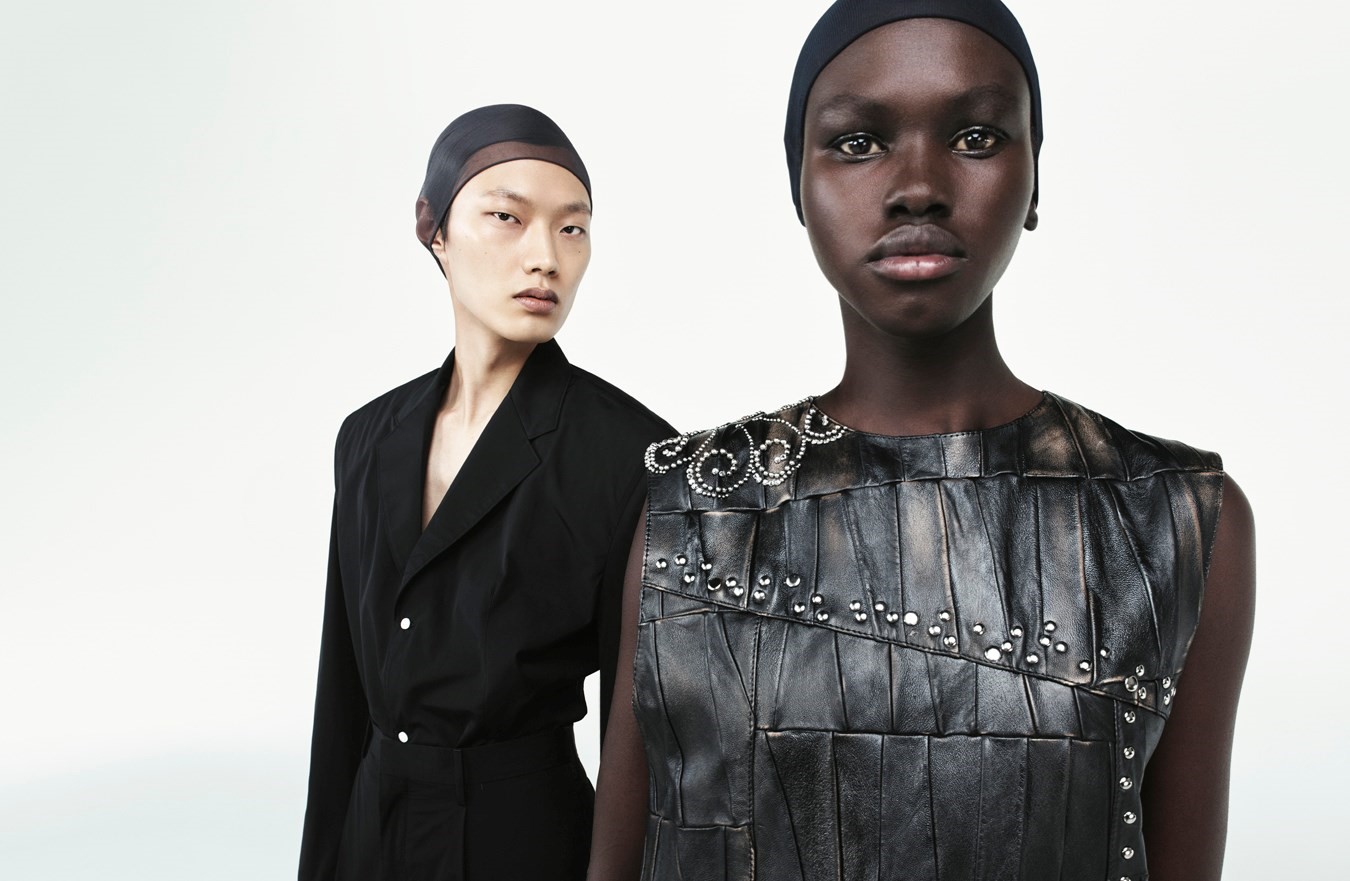
AF: Do you think your process has changed over time?
RS: In the three and a half years?
AF: Yes. Because I think the collections at the start were very much stripping things away, and I think this collection was more expanding. I don’t want to say elaboration.
RS: I don’t think it’s because of how we work. I think it’s because of what we want. What we did in the beginning is what we wanted. Did it succeed all the way? Maybe not.
MP: For sure in the beginning it was more about the theory, and now it’s more a pleasure.
RS: In the physicality of the situation, for sure.
SF: This relates to the conversation about digital media earlier, but for this particular collection, the one we saw in September, you had to be there. You had to be with the clothes and that’s not always the case. It feels like that was a driving force. The fabrication, the lightness, the heaviness – it felt like that this time. And perhaps prior to that it was more conceptual? I don’t know.
MP: Probably yes. Because somehow we had to start. Maybe it was also the mood. We decided that we didn’t want to tell specific stories. We always worked on a narrative.
SF: Why?
MP: Because it started feeling like something we had to do. I had to invent something new every time. So it didn’t come genuinely. “Which story for this season?” No. We’re better than that. At that moment we both felt that the narrative, for one reason or another, was not right any more.
It felt like it would have been a bit of a superficial approach or ... not dishonest, but a necessity. Let’s do theory, not stories.
“It’s the death of brands sometimes, losing their DNA. No matter how sublime they can be in the moment. But that’s also because of what the system became” – Raf Simons
SF: I think the narrative, the obsession with narrative, happened when people weren’t together in the pandemic. The kind of explosion, the need for narrative in marketing.
MP: But maybe that was the reason.
AF: I did want to ask a bit about your relationship with history – history generally and also the history of Prada, because in this collection you had the 1913 bag.
RS: I talk about it very often ... for several reasons. One thing is it’s a natural desire from my point of view, from my position. But maybe also a kind of responsibility.
It is important for the brand to keep introducing its DNA. Keep focusing on your DNA. And make sure that it is a natural thing for you, because when you are a designer – for me, anyway – there were moments back in the day where I wanted to reject something I did. To be new, to be different, to move on.
That’s partly important, but in a way it’s important to also find a balance between keeping the DNA and evolving. I really am only thinking about longevity. I have no interest in saying, “We need to succeed for the next show and then we’ll see.” No, it’s long term. It’s the death of brands sometimes, losing their DNA. No matter how sublime they can be in the moment. But that’s also because of what the system became. It’s like the switching of creative directors.
SF: For two years and then out.
RS: And I know Miuccia has a lot of interest in how I see fashion in general. I could also come in and say, “Reject, reject, reject, let’s move on.” No. I like to go back. I think it’s important. That’s your strength and your honesty. People connect to the brand, in part, for that reason. The brand has been always challenging. It’s not only about that bag, it’s gestures, it’s materials, it’s lots of things. I think it’s important.
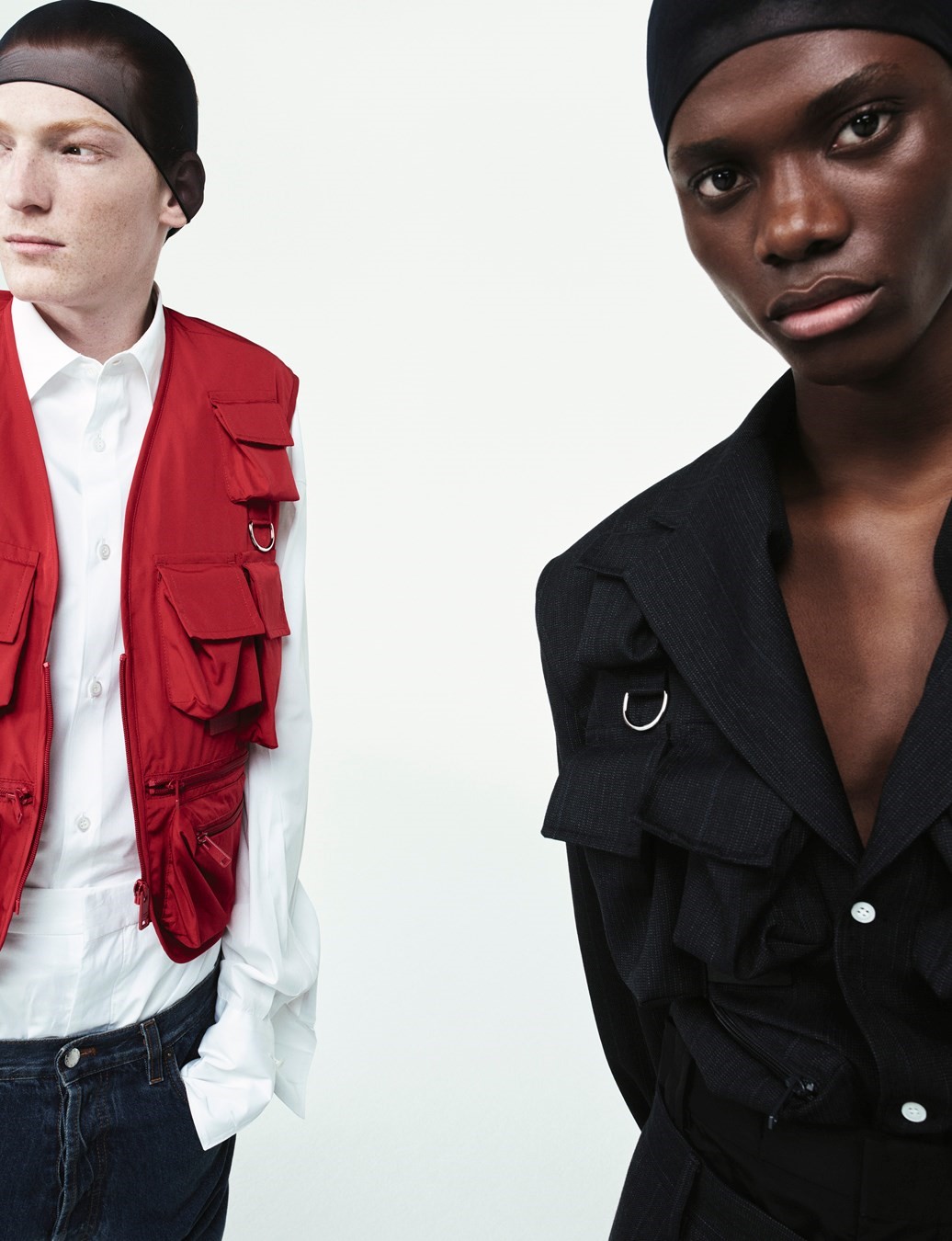
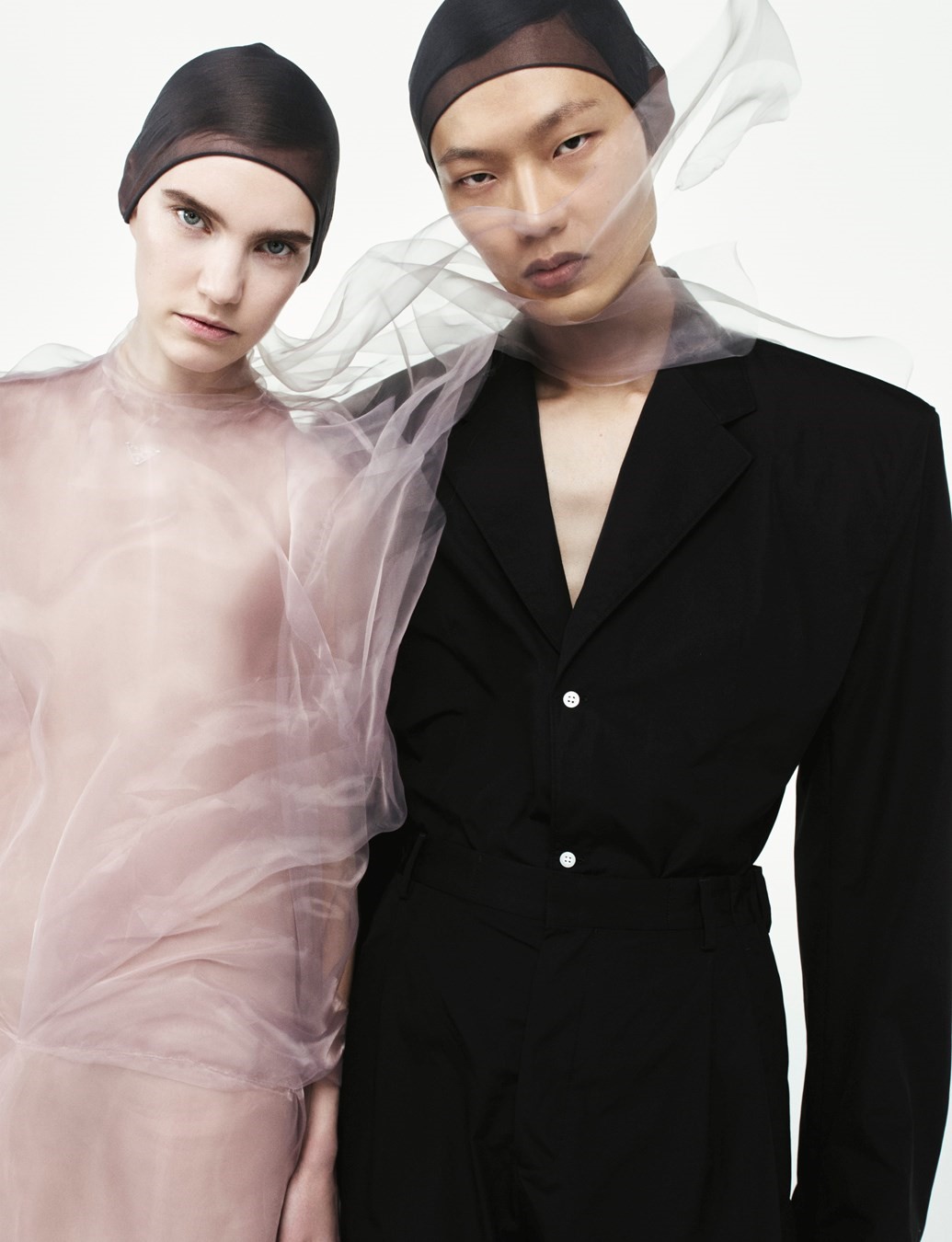
AF: I also think it’s interesting to look back. Some people may be aware of a contemporary history of Prada, maybe going back ten years, but many aren’t aware of Prada before that. And certainly a lot of people don’t know Prada started in 1913. They don’t know the depth of history there.
RS: I always had the feeling that I knew the brand extremely well.
SF: We talked before, Raf, about the idea of your intellectual luggage, and one of your pieces of luggage was Prada, of course, right down to gesture, the oversized coat gathered close to the body by clasped hands, for example …
RS: But curating the exhibition in Shanghai [Pradasphere II, which opened in December 2023 and ran until 21 January], it was mainly me who created the curatorial path of the collections. Six weeks. Until three in the morning. Look number one, 1988, all the looks until the last show.
It was a revelation to me to see the gestures, attitudes, items, silhouettes, styling, feeling in the first three shows. ... that are still here, in a way.
RS: I experience Miuccia every day. And it’s all there. People don’t know. That’s why the first silhouette in the exhibition is just a skirt, a white shirt and a heavy-soled black shoe, lace-up. Basta. I don’t care that people think, “Oh, is that first look not the gold, ornate showstopper?” – I don’t care. This is the most relevant DNA in Prada. Together with other things that come over time, such as gestures or materials.
I think it’s important. I think they also have proof, on the table, of one of the reasons the brand lasts. Besides Miuccia always challenges it, there is this contrast also.
I can pull looks out of the first show and you walk around and you won’t look so different from how Prada does these days.
AF: When you were going through that process, did you find things that really surprised you?
RS: Yes, of course.
AF: Like what?
“You have a natural attraction to make something not so perfect because, in a way, it’s also human to be imperfect” – Raf Simons
RS: There’s your early start, the environment in which you grew up – you always say you wanted to poke the bourgeois a little bit. You want to kind of disturb it. They have a perception of how something should look quite specific, in whatever material or shape. You often said, “But then I made a bad fit, something wrong.”
SF: Do you still feel like that? Do you still feel like you are prodding the bourgeoisie?
MP: I always like to do something wrong – yes, absolutely. It is more difficult to do something wrong, but we succeed I think.
RS: You have a natural attraction to make something not so perfect because, in a way, it’s also human to be imperfect.
AF: Is that an instinct you feel as well?
RS: I think more and more.
SF: And for you, Miuccia, what’s the importance of history? Will you talk to us about it?
MP: I don’t consciously analyse myself, my own history as a designer. But in a wider conversation a sense of history is deeply relevant – it has meaning. Understanding history is the only way we as people can learn. History shapes and forms who we are – it is our personal history as well as a wider cultural force. Yet today, history is so often forgotten. It is not trendy. For me, history and historical styles have always connected with women of the past, with the reality of people’s lives, not the history of fashion. I have always said this, but now it feels significant to be re-stated. Using those pieces connects us with the lives of the past. That’s why it is so important.
AF: To learn from it.
MP: Learn from it – in general and in fashion. In fashion, it represents ... It’s always a way of being a woman, her many different lives and moods.
AF: Identities?

MP: Yes.
SF: And cultures, to a certain extent. I was going to talk to you about the conversation around feminism – which is complicated now, because of an increasingly complicated conversation around gender.
MP: For 15 years I’ve wanted to do an exhibition at the Fondazione about feminism, but now I cannot. I could have done back then, with Ingrid Sischy. I told my people, let’s investigate, but there are so many different groups, so many different people – it’s impossible.
AF: I am always struck by how interested you are in the idea of non-binary gender, fluidity. Perception of gender is very different to how it was five or ten years ago.
MP: I care deeply about rights.
AF: I think it makes a big difference that it’s your name over the door and you’re involved in the creativity, the meaning of it. It’s a big difference to lots of other companies. I feel like you have an enormous respect for that as well, Raf.
RS: Of course, of course. I think it’s also because I know what it is to own a company. I had a company where my name was over the door. That’s also why I have ultimate respect for her, to [bring in a collaborator]. I couldn’t possibly. It’s natural and easy, but it’s incredible that she lets me make decisions. But then we do connect on so many aspects. We underestimate that sometimes.
AF: Mrs Prada, you were saying that you learnt from Raf this idea of putting the fabric on people. What do you feel that you’ve learnt during your time, Raf?
MP: The fabric story is a fun example. I indeed learnt very many things from Raf and many more to come.
RS: I learnt a lot. Ways of thinking, ways of looking at something in a different way. Technically also, I think that I like now to work in sections – let’s concentrate on the knits, let’s concentrate on the pants, let’s concentrate on the skirt. But that’s not how I usually see. I almost can’t design thinking about that. I see it as a look already – not one that’s perfectly defined. But I see these broken-up things already in the look. Even if it’s vague, vague, vague.
SF: Because it’s a person.
RS: It’s a person.
“I cannot really 100 per cent succeed. The way it is in my dreams, the way I imagine it to be, in the real world” – Raf Simons
SF: But you also see a person – Miuccia?
MP: Of course I have a vague idea of what I want, but I recognise it when it’s there. After working something appears and I say, “OK, that’s what I wanted.” But of course if you want or feel something new, you don’t know until you get there. You know the direction, the influence, but you don’t know until you see it. Then you recognise – it happens all the time. Finally, you say, “OK, this is good.”
RS: But in general, not connected to the relationship here at Prada, in general I always have the feeling I cannot really 100 per cent succeed. The way it is in my dreams, the way I imagine it to be, in the real world, it might be close but not exactly.
MP: Never? For me, maybe, once a year. Very rarely.
RS: Like maybe a piece or a look, but all the way, never. I also think that if it was really a full success, maybe I would stop. What am I going to do after? It’s also still a challenge, but I definitely don’t ever see it, the way that I imagine it. Miuccia, I think you do always know where I want to go. Maybe not literally but ...
MP: Many ways. After a while we discuss, we see, things become clear. Give me three hours or three minutes or three days – it’s a discovery.
SF: Are you still really excited by it?
MP: Recently, much more.
RS: Yes.
SF: Do you think you’ve energised each other?
MP: I spent a few years ... Loss of friends, dying ...
SF: We talked about that before.
MP: Sickness and various things. I had five, six years that were really difficult. But now I am in full force.
RS: And I like the daily thing – the beauty of a daily situation with Miuccia and the team and seeing things shaping up, whether it’s complex to get there or not. I like that. I like that more than the whole spectacle of fashion. It’s not so much in my interest any more ... the inside is what I like. The real inside of fashion.
MP: When I can say, “Today I only have to work,” for me it’s like a vacation. Because the rest of the time I have to take care of events, organising, this, that, so many different things. So when I can say, “Today I only have to work” – ahhh! Today, for instance, after we finish this, we have nothing but work. So that, for me, is kind of a vacation.
SF: That is perfect.
MP: And a pleasure.
Hair: Anthony Turner at Jolly Collective. Make-up: Lynsey Alexander at Jolly Collective using PRADA BEAUTY. Manicure: Chloé Nguyên. Models: Awwal Adeoti and Ayo Hassan at New Madison, Jolien Bosmans at Unit Model Management, Arthur Del Beato at Brave Models, Thibaud Charon at 16 Paris Management, Rejoice Chuol at Select Model Management, Elise Crombez at Why Not Models, Hoyong Kim at Ford Models Paris, Andrea Lai at Success Models, Sascha Rajasalu at Next Model Management, Adrians Smats at The Bro Models, Ilya Vermeulen at Platform Agency and Lina Zhang at Elite Model Management Paris. Casting: Ashley Brokaw. Lighting: Romain Dubus. Digital tech: Henri Coutant. Photographic assistants: Yves Mourtada and Vassili Boclé. Styling assistants: Niccolo Torelli, Kevin Grosjean, Jérémie Chegrane, Sara Maria Perilli and Ruile Zhang. Hair assistants: John Allan, Vincent Zimberlan, Yohann Jouvanceau, Jean Dorthu, Jesper Hallin, Delphine Bonnet, Irene Brenda and Yousra Adechokan. Make-up assistants: Phoebe Brown, Kana Nagashima, Joana Lafourcade, Anamarija Ivoš, Assia Caiazzo and Margarita Krupenich. Manicure assistant: Émilie Ruberia. Producer to Willy Vanderperre: Lotte Mostert. Production: One Thirty-Eight Productions. Executive producer: Simon Malivindi. Production co-ordinators: Davia Cardi, Olya Siniakov and Mari Sølvberg. Production assistants: Benjamin Vasseur, Nael Vilain and Dejan Trajkov. Special thanks to Stéphane Virlogeux
This story features in the Spring/Summer 2024 issue of AnOther Magazine, which is on sale internationally now. Order here.
